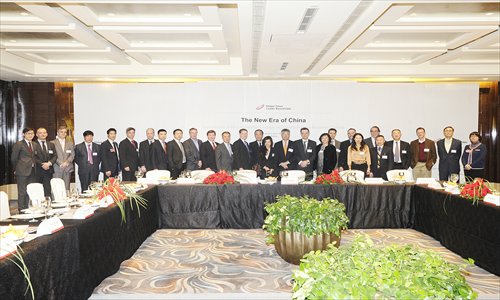Reform at last?

Many pages have been written about the changes that the new Chinese leadership may, should and will bring about in numerous arenas.
Focusing on the hopes and worries of multinational companies (MNCs) in China, the Global Times held its 10th Leader RoundTable on Tuesday, bringing leading executives, economists and diplomats together under the theme of "The New Era of China - Implications of the Leadership Change on China's Foreign Business Climate."
Xu Sitao, chief representative of the Economist Group in China and the evening's moderator, began by outlining the economic woes facing the new leadership. He explained that the current growth model is not sustainable and that both rebalancing and financial liberalization are long overdue.
The government is aware that market forces have moved beyond the control of regulators in some areas and that there are several priorities after the handover, Xu said, such as working on the business environment for MNCs, as well as incumbent Vice Premier Li Keqiang's promise of "structured tax cuts."
Xu invited Li Hongwei, managing editor of the Global Times, to provide an insider's perspective. Li acknowledged that expectations are high for the new leaders as the economy slows. For Li Keqiang, the main challenges will be the yawning income gap and political reform. Major obstacles to reform, such as State-owned enterprises (SOEs), are in place with not enough having been done in the last 10 years to overcome them.
For Robert Poole, former vice-president of the US-China Business Council, the voices calling for reform have grown louder both worldwide and in China over the last 18 months, peaking during and around the 18th National Congress of the Communist Party of China (CPC) in November 2012.
However, for any who thought that reform was a true government priority, Poole pointed out that a top-level business conference he had attended a couple of weeks before was full of the same empty slogans as before, with no real advances on offer.
The debate then switched to how intricately woven economic reform would be with political reform. Edward Tse, chairman for Greater China for Booz & Company, said that the time when people were satisfied just with economic reform is over, and that a discussion about political development is necessary, considering options such as evolution within the one-party system or drawing lessons from the Taiwan model.
Arthur Kroeber, managing director of GaveKal Dragonomics, concurred with Tse but added that separating political and economic reform would be difficult since many of the economic questions facing the government are political ones.
He explained that the former model of growth depended largely on the mobilization of capital, with little to no worry about efficiency or distribution, but that the era was now at an end.
Long-awaited reforms for SOEs, for property tax, for breaking local protectionism all require more political transparency, and could spark trouble if not done fairly.
Kroeber then moved the discussion on to innovation, saying that China's policies had pushed it further away today from the forefront of global innovation than it had been five years ago, in contrast to the US which continues to improve its speed of innovation.
This is one of the factors giving rise to public discontent, shown by Chinese people taking their capital abroad, as well as sending their children overseas to study at an increasingly early age. He concluded by saying that easing up restrictions would lead to more competition and innovation.
As SOE reform had only been touched upon until now, Lynn Lau, Asia Pacific Director of a major UK life insurance company, returned to the subject, offering up the Singapore model as one that Chinese officials were curious about.
The Singapore government has been trying to reduce the government's influence on the SOE sector. The Chinese insurance regulator has recently been freeing up investment channels which open up opportunity to foreign firms, recognizing that they are able to offer new options in areas such as asset management. Lau was optimistic the new leadership would seek to encourage foreign firms' participation in the economy.
These views on SOE reform were met with a rebuttal from Janet Kong, managing director of the research department of investment bank CICC. As the only SOE executive at the table, Kong took a different tack. She said that following the 18th National Party Congress, political tinkering might be on the table but that widespread political reform would not happen.
Kong questioned whether SOE reform would be one of the government's top priorities as SOEs still account for a sizeable amount of GDP. Likening it to the government cutting off its own hands, she also pointed to a wide number of industries, such as food and beverages, which are largely free of government interference.
Poole questioned this logic, saying that there are over 100 industrial sectors in which China restricts foreign access and that this form of protectionism neither served the country nor its consumers.
Xu Sitao returned to the Global Times' Li, asking him for his two cents on the matter. Li took a conciliatory line, agreeing with Kong that the leaders were stressing continuity and that not too much was expected.
However, he said that reform could well come within the ranks of the CPC as more and more entrepreneurs are seeking to join the Party in order to have a voice and an influence on policy.
As Xu went round the table for final thoughts, with SOE reform and more market access emerging as the most widely anticipated areas of action by the new government, the evening's best summary was provided by John Russell, managing director of communications consultancy North Head, who noted MNCs faced mixed business conditions.
While they often face real restrictions, they have still reaped high profits in the country, with Chinese branches of companies routinely posting much higher profits than EU or US counterparts.
However, Russell expressed worries how long these happy times could continue given market consolidation and increasing competition in many sectors.